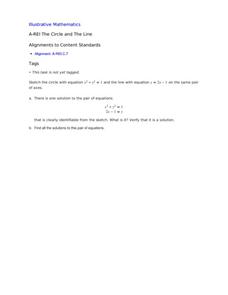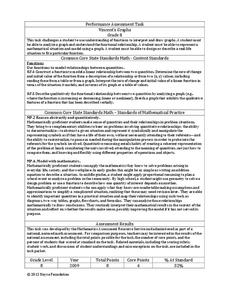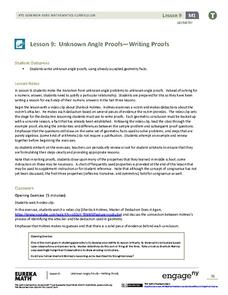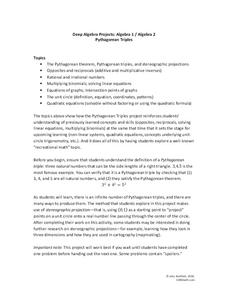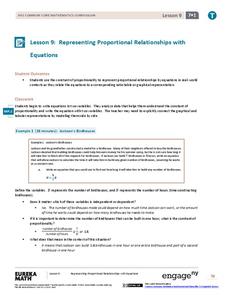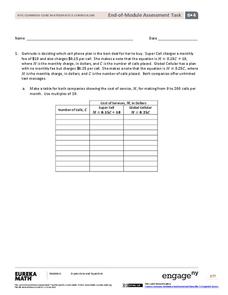Illustrative Mathematics
The Circle and The Line
Here is a resource where algebra learners show their understanding of a system of equations involving a circle and a line. Once graphed, learners see two points of intersection, one where the ordered pair is read, and a second where...
Illustrative Mathematics
Regular Tessellations of the Plane
Bringing together the young artists and the young organizers in your class, this lesson takes that popular topic of tessellations and gives it algebraic roots. After covering a few basic properties and definitions, learners attack the...
EngageNY
Events and Venn Diagrams
Time for statistics and learning to overlap! Learners examine Venn Diagrams as a means to organize data. They then use the diagrams to calculate simple and compound probabilities.
Illustrative Mathematics
Sum of Angles in a Polygon
How can learners use algebra to solve a geometry problem? Help learners create an equation that shows the relationship between the number of sides of a polygon and the sum of the interior angles. Young scholars are asked to divide the...
Illustrative Mathematics
Dimes and Quarters
Here is a coin problem where the algebra learner determines the pair of linear equations needed to solve the system. Whether the equations are taken from a table, or your scholars recognize the format of a coin problem, it is an...
Charleston School District
Pythagorean Theorem and Converse
You've heard that it is true, but can you prove it? Scholars learn the Pythagorean Theorem through proof. After an overview of proofs of the theorem, learners apply it to prove triangles are right and to problem solve. This is the second...
Mathematics Vision Project
Module 5: Rational Functions and Expressions
Where do those asymptotes come from? Learners graph, simplify, and solve rational functions in the fifth module of a 10-part series. Beginning with graphing, pupils determine the key characteristics of the graphs including an in-depth...
Inside Mathematics
Vencent's Graphs
I like algebra, but graphing is where I draw the line! Worksheet includes three multiple-part questions on interpreting and drawing line graphs. It focuses on the abstract where neither axis has numbers written in, though both are...
EngageNY
End-of-Module Assessment Task: Grade 7 Module 2
Learners demonstrate their ability to operate with rational numbers through a five-question assessment that includes questions ranging from simple operations with integers to solving two-step equations with rational coefficients.
Curated OER
Mixing Candies
Mixture problems are a classic in first-year algebra. Unfortunately, many learners approach them in a formulaic fashion and don't truly understand the meaning of the algebraic expressions they are using. Here, the questions are not the...
EngageNY
Unknown Angle Proofs—Writing Proofs
What do Sherlock Holmes and geometry have in common? Why, it is a matter of deductive reasoning as the class learns how to justify each step of a problem. Pupils then present a known fact to ensure that their decision is correct.
Mathematics Assessment Project
Generalizing Patterns: The Difference of Two Squares
After completing an assessment task where they express numbers as the difference of squares (i.e., 9 = 5^2 – 4^2), class members note any patterns that they see in the problems.
Curated OER
Rounding and Subtracting
Common Core is all about getting your learners to open their minds and think about the why and how. This problem has them thinking about unknown numbers and their relationship with one another when we round and...
Alabama Learning Exchange
Add, Subtract, and Multiply Matrices
Introduce the concept of matrices with a pre-designed instructional activity. Learners watch video lessons to learn the ins and outs of adding, subtracting, and multiplying matrices. Using provided problems, they practice each operation...
5280 Math
Pythagorean Triples
From Pythagorean triples to the unit circle. Learners use the Pythagorean Theorem to find Pythagorean triples and then relate their work to the unit circle in a fun algebra project. Their discovery that x^2+y^2 is always equal to one on...
Macquarie University
Logarithms and Exponentials
Introduce logarithmic functions and their properties with a straightforward lesson plan. It provides an introduction to new material, examples, and practice problems. The variety of problem types keeps learners engaged while...
Illustrative Mathematics
Equivalent Expressions
Here is a straight-forward problem of multiplying two binomials with a twist. It is up to algebra learners to decide how to turn this product of sums into a sum of products. However, it is not the quadratic that is the answer; it is the...
EngageNY
Unknown Angles
How do you solve an equation like trigonometry? Learners apply their understanding of trigonometric ratios to find unknown angles in right triangles. They learn the meaning of arcsine, arccosine, and arctangent. Problems include...
EngageNY
Representing Proportional Relationships with Equations 2
Scholars determine how long it takes to build a birdhouse with the second activity on using equations with proportional relationships. The resource uses examples such as birdhouse building and produce prices to encourage pupils to write...
EngageNY
End-of-Module Assessment Task: Grade 6 Math Module 4
Finish out the module with a bang. The last installment of a 36-part module is an end-of-module assessment task. Test takers set up equations to represent relationships and solve problems in an assortment of contexts.
PBL Pathways
Arch Project
Model real-life structures with mathematics. A project-based lesson presents a problem situation requiring classes to develop a function to model the St. Louis Arch and the Rainbow Bridge in Arizona. They create their models by...
EngageNY
From Ratio Tables, Equations and Double Number Line Diagrams to Plots on the Coordinate Plane
Represent ratios using a variety of methods. Classmates combine the representations of ratios previously learned with the coordinate plane. Using ratio tables, equations, double number lines, and ordered pairs to represent...
New York City Department of Education
Dance and Text
Use texts and dances to teach inequalities and equations. A sixth-grade unit covers using variables in equations and inequalities to solve problems. Learners show what they know at the end of the unit using two performance tasks, one...
Curated OER
Equivalent Expressions A.10
In this equivalent expressions worksheet, 9th graders solve and complete 9 different multiple choice problems. First, they determine the expression that is equivalent to the given equation. Then, students write the diameter of a number...
